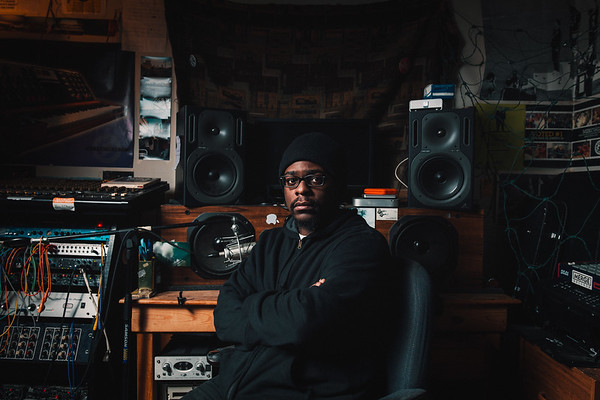Jan 13, 2026 2:09 PM
More Trump-Kennedy Center Cancellations
The fallout from the renaming of the John F. Kennedy Center for the Performing Arts to include President Donald…

In addition to producing, DJ Harrison plays keys and bass in Butcher Brown and on his solo projects.
(Photo: Joey Wharton)How has that curiosity, combined with the eclectic, super-individualist nature of the Richmond scene, informed your projects?
From experimenting, you can define what you like and don’t like. In Richmond, it doesn’t matter what kind of music we do; we’re all in the know. We’re all playing at the same venues, going to each other’s shows, having all the genres cross-pollinate. You never know where the inspiration is going to come from.
How have the relationships among Butcher Brown members allowed your sound to evolve?
Those are all my homies; we have fun on the road and in the studio. That translates into the recordings. People can feel that energy, and it’s all about energy—capturing and translating energy.
In terms of energy, you often create samples or sections that don’t seem totally aligned, like a rhythmic rub, which feels very natural.
Quantizing is great, but there has to be the human feel. There’s room not for error, but for imperfection. That applies to life, too. There are small imperfections that make certain things beautiful. Then those imperfections become what defines the song or the feel—they make one thing connect to the next.
Every #KingButch track feels like an answer to a two-part question: What do we do with these sounds that already exist, and how do we evolve them and make them personal?
Within Butcher Brown, there are so many different artists, and we’re listening to so many different records. We just wanna make sure there’s that lineage factor that connects all of that [in our music]. You can relate the album back to another album or production sound, but we’re putting our spin on it, trying new sounds, keeping it current. And it doesn’t matter what genre you call it or where we’re coming from. We just wanna make the music feel good. It’s like making a huge pot of soup. Everyone brings their ingredients and then you create something new altogether. That becomes the new recipe.
What prompted the formation of Jellowstone, and how has having this space allowed for greater autonomy around your artistry?
There have been three iterations of the studio. There’s the den, which is my mother’s house back in Chester. When I was in high school, I started collecting gear and recording. When I graduated from college, I moved into a house in Richmond on Georgia Avenue; we just called that The Georgia House. And it just kept expanding. After The Georgia House, we moved here in 2012. Everyone in the band has lived here. I’m not sure what it is about this house, but there’s an energy/synergy here. With all the gear and all the music that’s been created here, it’s comfortable. And you gotta be comfortable to be able to make good music.
Here, I can make sure the idea sees its full potential. It’s been instrumental—no pun intended—for helping us have a safe space to create. And I don’t question it. It’s like, “This is the vibe. Everyone believes in it, so leave it alone. Keep doing what you’re doing. Let the energy take over.” DB

Belá Fleck during an interview with Fredrika Whitfield on CNN.
Jan 13, 2026 2:09 PM
The fallout from the renaming of the John F. Kennedy Center for the Performing Arts to include President Donald…

Peplowski first came to prominence in legacy swing bands, including the final iteration of the Benny Goodman Orchestra, before beginning a solo career in the late 1980s.
Feb 3, 2026 12:10 AM
Ken Peplowski, a clarinetist and tenor saxophonist who straddled the worlds of traditional and modern jazz, died Feb. 2…

The success of Oregon’s first album, 1971’s Music Of Another Present Era, allowed Towner to establish a solo career.
Jan 19, 2026 5:02 PM
Ralph Towner, a guitarist and composer who blended multiple genres, including jazz — and throughout them all remained…

Rico’s Anti-Microbial Instrument Swab
Jan 19, 2026 2:48 PM
With this year’s NAMM Show right around the corner, we can look forward to plenty of new and innovative instruments…

Richie Beirach was particularly renowned for his approach to chromatic harmony, which he used to improvise reharmonizations of originals and standards.
Jan 27, 2026 11:19 AM
Richie Beirach, a pianist and composer who channeled a knowledge of modern classical music into his jazz practice,…